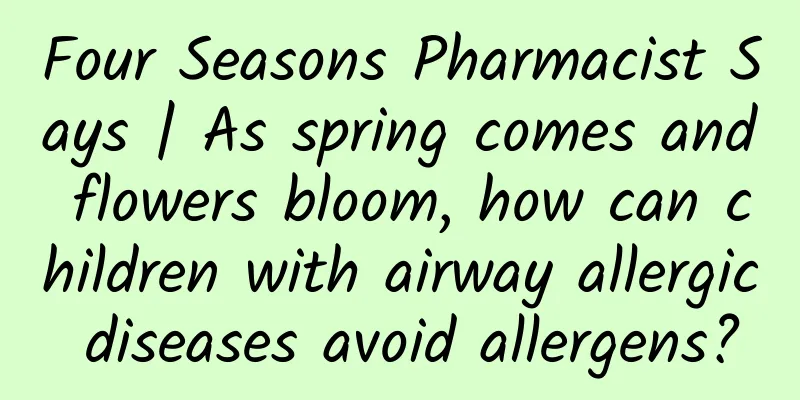Four Seasons Pharmacist Says | As spring comes and flowers bloom, how can children with airway allergic diseases avoid allergens?

|
When spring comes and flowers bloom, it is a good time to go outside and enjoy the beautiful scenery. However, it is a very painful time for children with airway allergies. They often sneeze, have runny nose, nasal congestion, cough, and even have acute airway reactions, which makes parents anxious! This is because pollen, poplar fluff, dust mites, etc. in the air are allergens. Airway allergic diseases not only affect the quality of life of children, but sometimes even endanger their lives. For children with airway allergic diseases, avoiding contact with allergens is a very effective prevention and treatment method. Today, Yaowa will give you some tips - how to help children with airway allergic diseases avoid common allergens. The first step to avoid dust mites Dust mites are tiny arthropods that are commonly found in people's homes and are widely distributed. They like to live in warm (15℃~35℃), humid (humidity 50%~80%), dark environments. Common ones include house dust mites and dust mites. Children who are allergic to dust mites will experience symptoms such as nasal congestion, nasal itching, continuous sneezing, tearing, and dry cough when they come into contact with dust mite environments such as quilts, beds, and pillows. To avoid dust mites, Yaowa has a trick 1. Keep the room clean and well ventilated, and reduce the indoor humidity (<50%-55%); 2. Use well-sealed bed boards and pillows. You can add a dust mite cover on the child's mattress. 3. Wash bed sheets and pillows in hot water (>55℃) every week; 4. Try not to place stuffed toys, carpets, tapestries, etc. in your home. Tip 2: Avoid pollen Pollen is spread mainly in two forms: insect-borne and wind-borne. In addition to those colorful flowers, children are also allergic to pollen because of trees and weeds that do not seem to bloom, such as the sycamore, birch, and poplar trees that are widely planted in most cities in my country. These plants have a high pollen content and are very light, which is dispersed in the air by the wind. Children who are allergic to pollen will also experience symptoms such as nasal congestion, itchy nose, continuous sneezing, tearing, and dry cough when exposed to pollen. To avoid pollen, Yaowa has a trick 1. When there are high-density plants near your home, try to keep the windows closed; 2. Reduce or avoid drying the sick child’s bedding outdoors; 3. Reduce the outdoor activities of children. If going to areas with high pollen density, children should wear masks; 4. If conditions permit, air filters can be installed. Tip 3: Avoid cockroaches Cockroaches, commonly known as "Xiao Qiang", are at their peak of reproduction in spring, with nests of cockroaches ready to move. Children who are allergic to cockroaches are not only allergic to the cockroaches themselves, but also to their secretions, excrement, and corpses. To avoid cockroaches, Yaowa has a trick 1. Use safe insecticide to kill cockroaches; 2. Repair the gaps in the walls of your home to ensure that your home is dry and clean; 3. Cultivate good eating habits in children and do not bring food into the bedroom; 4. Clean up food residues and garbage promptly to avoid creating "food conditions" for cockroaches. Tip 4: Avoid mold The mold we often talk about is the common name for various fungi. These molds are very small and can only be seen under a microscope. Children who are allergic to mold often have symptoms such as coughing, sputum, and wheezing. Especially during the rainy season, parents must pay attention. To avoid mold, Yaowa has a trick 1. Keep your home dry and ventilated, and keep humidity below 50%; 2. Bathrooms, basements, etc. need to be dehumidified regularly to avoid accumulation of residual water; 3. Sewers, kitchens, trash cans, air conditioning filters, etc. need to be cleaned and disinfected regularly to prevent mildew; 4. If the child's clothes and bedding are moldy, they need to be cleaned and disinfected in time; 5. Carpets, books, newspapers and clothing should be protected from moisture and mildew, and food should also be stored properly to prevent mildew. Developing good living habits is also very important for children with airway allergic diseases. The key is to eat a nutritionally balanced diet, actively participate in physical exercise, and develop good work and rest habits. |
Recommend
What is the cleanliness of vaginal discharge?
What is the cleanliness of vaginal secretions? Ma...
Is postmenopausal endometrial thickening cancer?
Many women experience endometrial thickening afte...
What causes acne during menstruation?
I believe many people have the same problem. Acne...
Treatment for green stools in pregnant women
We all know that many people around us have the p...
The temperature drops in autumn and winter. People with high blood pressure should pay attention to changes in blood pressure.
Many friends with high blood pressure asked Huazi...
Hot search! Quan Hongchan: Spend half an hour tying bandages before diving! What are bandages for?
Review expert: Wang Xuejiang, professor of pathop...
What to do with a woman who is too yin
In terms of home Feng Shui, insufficient Yang ene...
Can I have sex while taking interferon?
If interferon suppositories are needed for gyneco...
Does ovarian teratoma affect fertility?
Ovarian teratoma is a common gynecological tumor,...
Five months pregnant, slight stomach pain
Pregnancy is a very critical period for every wom...
After pregnancy, I only want to eat vegetarian food.
Pregnancy is a happy thing, it is the fruit of lo...
Can you wear a body-shaping garment while running? Why is a body-shaping garment not suitable for running?
Wearing a body shaper for a long time can make yo...
Erythromycin ointment for vulvar eczema
Eczema is a very common skin disease in the human...
Counterpoint: Motorola is the company with the largest outsourced design shipments in the first half of 2024, followed by Xiaomi with 78% of its mobile phone designs outsourced
It is quite common for smartphone OEMs to outsour...
Can eating buckwheat regularly really lower blood sugar? How to eat buckwheat to lower blood sugar better
Buckwheat is a common whole grain in our lives. I...









